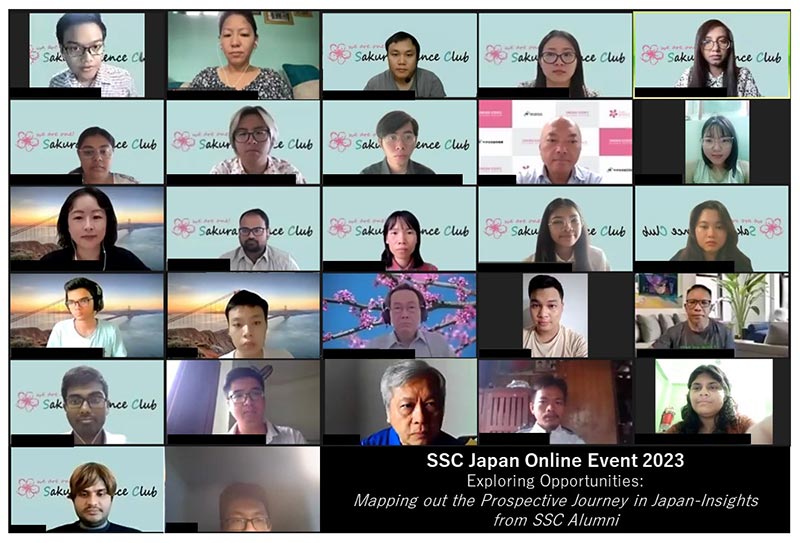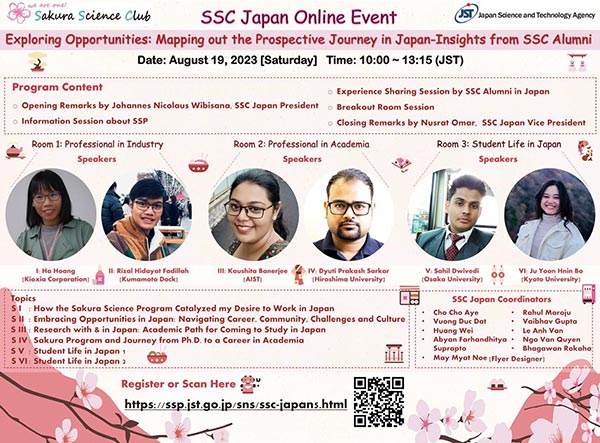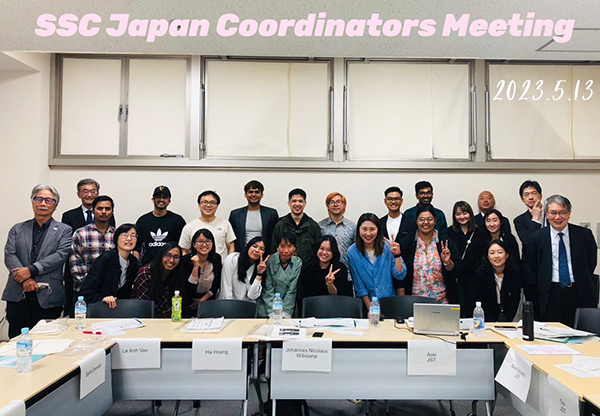Events
Alumni in Japan Provided Insight and Guidance through Online Event
The SSC Japan online event on August 19 “Exploring Opportunities-Mapping Out the Prospective Journey in Japan-Insights from SSC Alumni” enjoyed 127 participants across different regions, thanks to all the hard work by the coordinators. The purpose of the event was to boost exchange between the speakers and those wishing to study or to work in Japan. Ever since SSC Japan started to bring online events, survey respondents asked for more interactive events and for the first time, SSC Japan was able to respond to such demands through the breakout sessions. SSC Vice President Ms. Nusrat Omar moderated the event and Mr. Le Anh Van, who created the event PV, took on the role of Zoom main host. Below are some of the main points discussed in the breakout rooms. All session videos are available on SSC YouTube Channel.

Room1 Professional in Industry: Ha Hoang and Rizal Hidayat Fadillah
Moderator: Rahul Maroju
This room addressed prior questions sent in by registrants and discussed effective job-hunting tools (i.e. LinkedIn), different internships available, job application from overseas. To gain work-experience in Japan, Mr. Rizal recommended Japan’s Ministry of Economy, Trade and Industry (METI) internships for applicants outside of Japan. After the internship, a full-time job can be offered too. This type of programs may prevent mismatched placement. He also mentioned that some countries may have specific portals for job application in Japan. For the Philippines, for instance, one would go through POLO-OWWA an arm of the Department of Labor and Employment.
Instead of finding jobs directly from outside Japan, Ms. Ha Hoang looked back and advised that “you can use your master’s degree in Japan “as a stepping stone” to look for professional jobs in Japan. JST Advisor Dr. Ooi also agreed and emphasized that in Japan, there are many graduate programs conducted in English.
In the hiring process of international students, employers hire students by initially conducting interview in English, and thus, language proficiency is not a must at the beginning. But gradually, international employees are expected to learn and communicate in Japanese to some extent. Japanese language courses are oftentimes provided by the employer. Typically, job hunting in Japan for students starts from end of February or early March and lasts until June-July. You will be able to view details of this session here.
Room 2 Professional in Academia: Kaushita Banerjee and Dyuti Prakash Sarkar
Moderator: Abyan Farhandhitya Suprapto
An abundance of information was shared in this session ranging from different types of post-grad fellowships offered by JSPS and funds that allow international researchers to continue their academic career in Japan after obtaining PhD.
There were also specific questions related to obtaining a second PhD, majoring in the medical field in Japan, the GPA cutoff for MEXT scholarship, and so on, which were all addressed during the session. You can view the whole session here.
Finally, in response to Mr. Abyan’s question on how to keep up one’s motivation to pursue a path in academia, Dr. Dyuti said that his basic motivations are both research-oriented and teaching-oriented. He had set his mind towards PhD while still at Presidency University (Kolkata). There, he had many chances to know how research contributed to society. Finding solutions in itself creates joy, he said.
Dr. Kaushita added that the research journey is tough. There are many highs and lows─one has to be able to accept failure. “But the small joys of getting results overshadows the struggles,” she concluded and commented that “research in academia allows you to use your mindset and your ideas. No one else would govern you, unlike in industry.” During her PhD. in India, she had an opportunity to collaborate with Japan which eventually led her to where she is today.
Room 3 Student Life in Japan : Sahil Dwivedi and Ju Yoon Hnin Bo
Moderator: Johannes Nicolaus Wibisana
Many specific questions related to the MEXT scholarship were raised in this session. Mr. Sahil, who obtained his bachelor’s degree in Japan as a MEXT student, suggested first to contact the embassy of Japan in one’s country/region. There is a section dedicated to “Study in Japan.” The embassy screening involves an exam and an interview. The interview itself is not technical but one has to clearly state his/her motivation to go to Japan. The process takes about 7-8 months to know if you are accepted in the upcoming academic year (starting in April). Japanese language skill is an add-on but is not required if you are going for science. When you get accepted as a MEXT student, then one gets to think of which university you want to choose. Then another interview/exam would be conducted at that university.
When asked about the biggest challenge in Japan, Ms. Ju explained that knowing the language is always better even if it is not required in the coursework. By using the language more, Mr. Sahil pointed out that one would better understand Japan and its social ways.
For the English track in Japan, Mr. Nico emphasized that contacting each university directly is very important. One needs to double-check if Japanese is necessary or not and to search through research topic/field, laboratory, professor or faculty members to know what you will face ahead. More universities in Japan do provide English programs now─some at undergrad level and most in master’s/PhD courses. You can view the whole session here.
SSC Japan, consists of members who are in Japan now for work, study or research. SSC Japan is currently headed by President Mr. Johannes Nicolaus Wibisana and Vice Presidents Dr. Kaushita Banerjee and Ms. Nusrat Omar. Just like in other countries, coordinators were selected through an open call in March 2023 and met in person at JST on May 13, 2023 to plan details for this online event. JST wishes to praise contributions by all coordinators and supporters. Congratulations!









